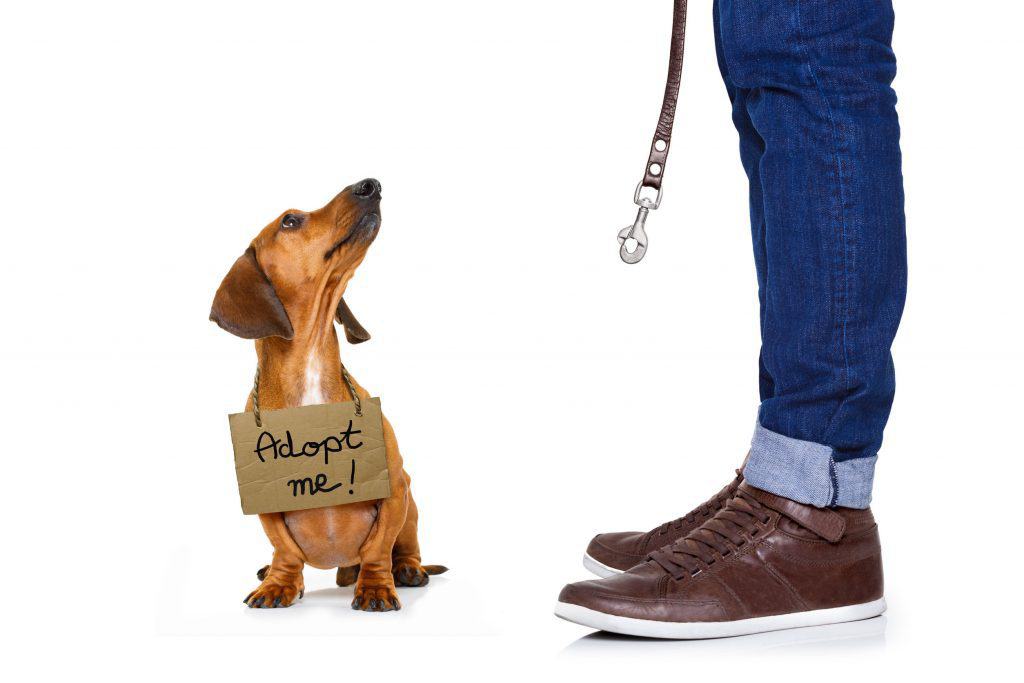Dachshund Rescue Guide: How to Find One and What it Will Be Like

You may be considering rescuing a dachshund, but maybe you are wary. Maybe you don’t even know where to start! Well, I have wondered the considered the same thing. So, I did some research and what I found was fascinating.
So, how do you find a dachshund to rescue, and what will the aftermath be like? Local rescue shelters and online sites are good places to start looking for a dachshund. Certain rescue situations can be more difficult, such as dachshunds who have suffered abuse, but depending on the situations, most all of them pay off.
Depending on what kind of situation a dachshund came from, each rescue situation will vary in difficulty and length of the adjustment period. What I found in the rest of my research was fascinating.
How to Find a Rescue Dachshund
So, where can you start? With a little research, there are many options and places that rescue dachshunds, and then put them up for adoption. It is important to do your research before you settle down on any place or any pet. But, it is important to get started on the process quickly once you know for sure, because the adoption process can take a long time to finalize.
When researching rescue places be sure to ask specific things that will help you in your search. This can include information about when and why this group does what they do, how it cares for its rescue animals, how it decided which animals are ready for adoption and what services are available for adoption and post-adoption.
Try to find a rescue organization in your area. This allows you to visit your dog and spend time with them while working on the paperwork and details of the adoption.
This also allows the company to possibly make home visits. This sometimes, depending on the situation, is necessary because the organization want’s to make sure that the dog is happy with you and your home.
Some popular dachshund rescues, according to Dachshund World are:
- Alberta Dachshund Rescue (Alberta and Western Canada)
- All American Dachshund Rescue (Southern United States)
- Almost Home Dachshund Rescue Society (Nationwide)
- Central Texas Dachshund Rescue (Texas)
- Coast to Coast Dachshund Rescue (CCDR) (Nationwide)
- Dachshund Rescue of North America (DRNA) (Nationwide)
- Dachshund Rescue Web Page (Nationwide)
Each of these different organizations have different things that they focus on and take pride in. Be sure to instensely research and choose which one will be the one that helps you to find your new dachshund member of the family.
What to Know Before You Adopt a Rescue
One thing that is crucial to know before adopting a rescue dog is the wide variety of circumstances that your dog could have come from. There are approximately 3.9 million dogs are taken into shelters every year around the U.S. Of those, 1.6 million dogs are adopted. But, the heartbreaking thing is that almost just as many dogs are euthanized. Approximately 1.2 million dogs are euthanized every year in the U.S.
“The sadness I feel looking into cages is nothing compared to how it must feel to look out.”
Unknown
Although it is immensely heartbreaking that these many dogs are homeless and in trouble, it is important to self-evaluate and make sure that you are ready to adopt a dog. What is even more heartbreaking than a dog being stuck inside a rescue organization is a dog finding what it thought was it’s forever home, and either being neglected again or returned back to the rescue organization. It is crucial that you make sure you are emotionally, physically and financially ready to bring a dog into your home.
Rescuing a dog is one of the most rewarding, and challenging, jobs you will ever face.
Wide Open Pets
Situations Rescue Dachshunds Come From
There can be many different situations but most often they are not happy situations. Some of those include:
- Hoarder’s homes
- failed breeding situations
- abandoned (left at the vets or boarding kennels)
- homeless
- abusive situations
- neglectful owners
These dogs can be severely affected by different situations they’ve been. They can become skittish, aggressive, distant and non-trusting. But, these things can be helped and managed with patience and tender loving care. Also, it is crucial to remember shelter dogs are NOT BROKEN OR PROBLEMATIC. While many have been through severe traumatic experiences or have certain medical problems, that does not make them broken or dangerous.
How to Qualify to Rescue A Dachshund
Different rescue organizations each have their own set of rules and qualifications they require from each potential adoption individual. There are a few requirements that are pretty around the board though and those are:
- no criminal record of animal abuse or domestic abuse
- must fill out an adoption application to screen for any problems
- if adoption individual will allow for the dog to have free access to a backyard, that backyard must have a fence
- if living in an apartment or condo they must show the investigator how they plan to allow the dachshund exercise
- if renting, they must have written consent from the landlord
- must allow someone to come and perform a “home visit inspection” to ensure that the individual is qualified
- all current pets in the home must be spayed or neutered as well as up to date on vaccinations
How to Prepare for Bringing your Adopted Dog Home

It is important that your home and family is completely prepared for the new addition to the family! The first month or so will be intensely stressful for your dog, so it is important to have the dogs routine and place in the family figured out before they get home. Here is a list of some things that you’ll need to think about before bringing your new furry friend home.
- Prepare everyone in the home for what their responsibilities will be with the new member of the family. Go over this several time and make sure it is engrained in the daily grind before the dog comes home.
- Buy all of the things that you will need for your new furry friend including food, food bowls, crate, bed, blankets, chew toys, treats, a collar and anything else your dog might need.
- Get a nearby
vet that you will take your dog to for annual check-ups. Also get the number and address of anear-by animal hospital. - Get together and organize any records and papers for your dog. Include all vet records and keep them organized and in an accessible place.
- Make sure to dog-proof your house. Get gates for places the pup won’t be allowed, tape all electrical wires, move chemical and other dangerous items out of dogs reach and anything else that may be harmful.
- Bring your dog home at the beginning of the weekend or at the beginning of a day where you can devote that entire day to them, and helping them acclimate. In the car make sure they are secure and belted in either by crate or seatbelt.
- Immediately bring your dog home and show him where he will use the potty. Stay there with him until he goes to the bathroom.
Difference Between Rescue and Shelter
Shelters and rescues are very different for a couple of reasons. Both are good viable options for both surrendering and taking in animals.
Animal shelters are often completely booked because they take in all speices. This is good as well as bad, because that leads to limited room in shelters. Many animals have to be euthanized every year because of lack of space at the shelter. More animals are filtering through the shelter because of this lack of space. Because of this, often the shelter is eager to get you to take the pet home, and the scanning process of owners is less thorough. This can be bad for both you and your pet.
Animal rescues, on the other hand, don’t take in all animals, but mostly take in pet and companion animals instead. They find these animals homeless and often in abusive situations. Often they are even breed-specific which can be beneficial when you’re looking specifically at dachshunds to rescue. These animals are often homed in actual house situations rather than in a crowded shelter until they are ready to be around humans.
The adoption process is often much more involved with a rescue as well. Each potential adopter is run through many tests and scans to make sure that you find your perfect pet and more importantly that animals don’t go into another abusive situation.
Common Issues with Rescue Dogs
Those rescue dogs that have been through some traumatic experiences often express this with similar issues. While some of these issues may be challenging, but with dedicated training and loving patience, these issues can be solved.
- Food Aggression/Resource Guarding – This can be a problem when there are other pets in the home already. Your new dog may have had to fight for food and shelter in the past, so this issue may come up. but, with some training and adjustment, your new dog can learn to eat and play nicely with your other dogs.
- Fear – This is a very common issue with rescue dogs. Each dog will have their own fears and own hurdles that they have to face because of the situations they’ve been in, in the past. This can be expressed either with the fight or flight response, both dangerous to the dog and owner. This is why it’s crucial to microchip your dog ASAP because their flight response will cause them to run as well as train them with loving patience to trust you. Positive reinforcement and exposure will also help these fears to subside.
- Discipline – When teaching your dog right from wrong, rescue dogs will often react differently to a raised voice or pointed finger. These things may have been a signal that they were about to get hurt. It will take time for them to understand that discipline does not equal abuse.
- Teaching – Sometimes you have to teach your rescue dog things that you feel they should already know. But often they were never taught things such as potty training and how to play with toys. Or, as a result of the trauma, they’ve experienced, they’ve forgotten how to do these things. Be patient with them, they’ll pick it up.
- Socializing – Some rescue dogs may be stand-offish towards other dogs or humans. Give them time to adjust to you, your family and their new home before introducing them to others. Then expose them slowly to new breeds of dogs, and new people.
Adjustment Period
The first period of time when you bring your rescue dachshund home will be the most crucial. The first week, and even going into the first month there are a few things that it is crucial that you pay attention to.
- Stress – Your dachshund will most likely become stressed in this adjustment period because of the change of environments. Especially if all they’ve ever known is violence and abuse. Be patient! It is important to allow the dog a place to be or hide. Often a good place for this is the kitchen, because of messes they may make.
- Potty-Training – Often during the stress, your dog might forget any kind of potty training that he has received if they’ve received any at all. Messes may be made, but try to be patient and teach your dog the way things will be in the future. Lead with kindness.
- Crates – If you plan on crate-training your dog be sure to have it set up before your new dog gets home. This will be a good place for him to be when they need a break from stimuli.
- Dog-Proof – Be sure to dog-proof the place that your dog will be spending most of their time. Tape electrical wires, and put away anything dangerous.
- Training – Even though you may want to give your dog a break during the adjustment period it is important to start training immediately. Training is a crucial part of adjusting. Get your dog used to the commands and actions that you will be using.
- Tags – Be sure to bring an ID tag with your phone number on it when you go to pick up your dog. Also be sure to register with the chip if your dog has one. For the first bit, your dog can still be unsure of you and try to make a break for it.
- Strangers – Be sure to give your dog some time to adjust to you and their new home before introducing them to any new people. Allowing this will help your dog see you as a trustworthy constant source of protection.
- Food – Ask when and what your dog was last fed. Follow this regimen exactly for the next bit while they adjust. Not doing this can cause digestive stress. You can introduce new food and change feeding schedule after your dog has adjusted.
- Social Schedule – During this adjustment period, it is incredibly crucial that your dog’s social schedule be very balanced. Have some time with the family around him, and giving him loving tender affection followed by time for solitary confinement. Not doing this can overstimulate your dog. As well with this, keep the volume down around your dog.
- Overall it is important to be very patient with your dog because often their life has been a series of confusion and violence.
Related Questions:
Do dachshunds need a lot of
How long does it take for your dog to settle in? It mostly depends on specific dogs and families, but some important milestones for your rescue dog will be 3 days, 3 weeks and then 3 months. If your dog isn’t adjusting by 3 months, it might be time to consult the vet for possible causes.
Do dogs know that they are being rescued? Dogs often have a sense for people and situations. They often read things better than we do. It can’t be said for sure, but we can assume that once they are in their home and settled, they are grateful and content for their new safe, loving home.

